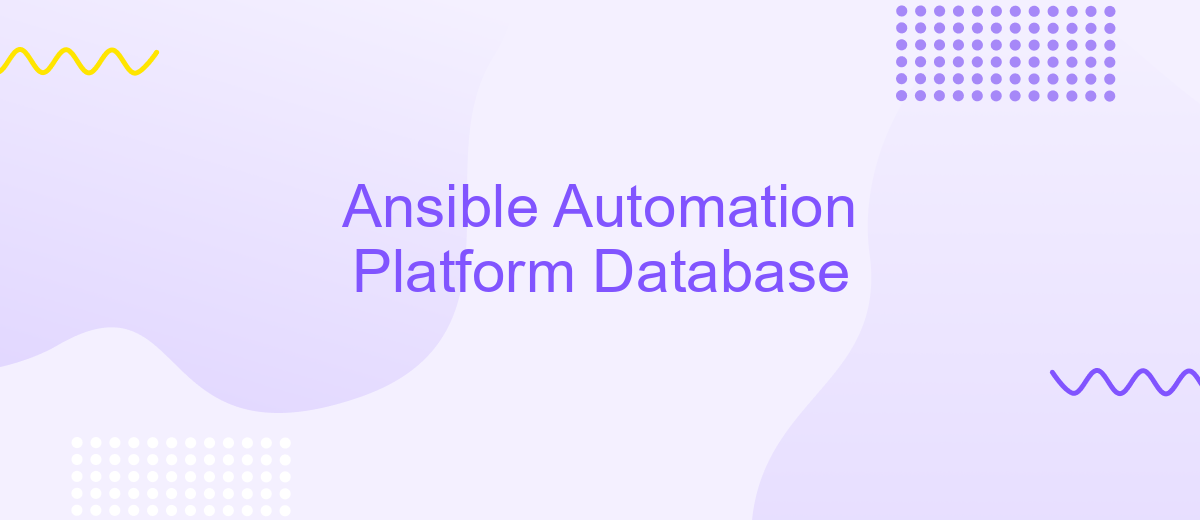Ansible Automation Platform Database
The Ansible Automation Platform Database is a pivotal component for managing and orchestrating IT environments with efficiency and precision. By leveraging its robust capabilities, organizations can streamline complex processes, enhance scalability, and ensure consistent deployments across diverse infrastructures. This article delves into the core features and benefits of the Ansible Automation Platform Database, offering insights into how it empowers IT teams to achieve seamless automation and improved operational agility.
Introduction
The Ansible Automation Platform Database plays a crucial role in managing and orchestrating automated tasks across diverse IT environments. It provides a centralized repository for storing configuration data, playbooks, and inventory details, enabling seamless integration and efficient management of automation workflows. As organizations increasingly adopt automation to streamline operations, understanding the architecture and functionality of the Ansible Automation Platform Database becomes essential for maximizing its benefits.
- Centralized storage of automation assets
- Facilitates collaboration among teams
- Enhances security and compliance
- Scalable to accommodate growing data needs
- Supports integration with various IT systems
By leveraging the capabilities of the Ansible Automation Platform Database, organizations can achieve greater agility and operational efficiency. The database not only simplifies the management of complex IT environments but also enhances collaboration among different teams by providing a unified platform for automation resources. With its scalable architecture, it can adapt to the evolving needs of businesses, ensuring that automation efforts remain aligned with organizational goals. Understanding its features and best practices is key to harnessing the full potential of automation strategies.
Benefits

Ansible Automation Platform Database offers a robust solution for managing complex IT environments. By centralizing automation tasks, it reduces the time and effort required for configuration management, provisioning, and application deployment. This results in increased efficiency and consistency across systems, minimizing human error and enhancing overall productivity. The platform's scalability ensures it can adapt to both small and large infrastructures, providing a flexible solution that grows with your organization's needs.
Integration capabilities are a significant advantage of the Ansible Automation Platform Database. With services like ApiX-Drive, users can seamlessly connect various applications and systems, streamlining workflows and improving data accuracy. This integration empowers IT teams to automate processes across different platforms without the need for extensive coding knowledge, fostering a more agile and responsive IT environment. Additionally, the platform's open-source nature encourages collaboration and innovation, allowing users to tailor solutions to their specific requirements and benefit from community-driven enhancements.
Use Cases

Ansible Automation Platform Database provides a robust foundation for managing and automating IT infrastructure. Its versatility makes it suitable for various scenarios, enhancing operational efficiency and reducing manual workload.
- Configuration Management: Automate the setup of servers and applications, ensuring consistency across environments.
- Application Deployment: Streamline the deployment process by automating the steps involved in rolling out new applications or updates.
- Network Automation: Manage network devices and configurations, reducing downtime and human errors.
- Cloud Provisioning: Simplify the management of cloud resources across multiple providers, optimizing resource allocation.
- Security and Compliance: Automate security patches and compliance checks, ensuring systems remain secure and compliant.
By leveraging the capabilities of the Ansible Automation Platform Database, organizations can achieve greater agility and reliability in their IT operations. Its ability to integrate with various systems and platforms makes it an indispensable tool for modern IT environments, allowing teams to focus on strategic initiatives rather than routine tasks.
Components

Ansible Automation Platform Database is an integral part of the automation ecosystem, providing robust data management capabilities. It serves as the backbone for storing and retrieving data necessary for efficient automation processes, ensuring that all operations are executed smoothly and effectively. The database is designed to handle the complex requirements of modern IT environments, offering scalability and reliability.
The platform leverages a combination of open-source technologies and proprietary solutions to deliver a comprehensive database solution. This ensures that users can benefit from both the flexibility of open-source and the advanced features of proprietary tools. The database supports a wide range of data types and structures, making it versatile for various automation tasks.
- Data Storage: Efficiently stores configuration, inventory, and state data.
- Data Retrieval: Fast and reliable access to necessary information for automation tasks.
- Scalability: Easily scales to accommodate growing data needs.
- Security: Implements robust security measures to protect sensitive data.
Overall, the Ansible Automation Platform Database is a critical component that enhances the functionality and performance of automation workflows. By providing a reliable and scalable data management solution, it empowers organizations to streamline their automation efforts and achieve greater operational efficiency.
- Automate the work of an online store or landing
- Empower through integration
- Don't spend money on programmers and integrators
- Save time by automating routine tasks
Implementation
Implementing the Ansible Automation Platform Database involves several key steps to ensure seamless integration and efficient operation. Begin by setting up the database infrastructure, ensuring it meets the necessary requirements for storage and performance. Choose a reliable database management system that aligns with your organization's needs. Next, configure the Ansible Automation Platform to connect with the database, establishing secure authentication protocols and permissions to safeguard data integrity.
For enhanced efficiency, consider integrating with ApiX-Drive to automate data flows between your Ansible Automation Platform and other applications. ApiX-Drive facilitates seamless data synchronization, reducing manual intervention and potential errors. Implement monitoring tools to track database performance and automate routine maintenance tasks. Regularly update both the database and the Ansible platform to leverage new features and security patches. By following these steps, you ensure a robust and scalable implementation of the Ansible Automation Platform Database.
FAQ
What is Ansible Automation Platform Database used for?
How does Ansible Automation Platform Database improve automation workflows?
Can Ansible Automation Platform Database integrate with other tools?
Is it possible to automate database management tasks with Ansible?
How can I ensure the security of data in Ansible Automation Platform Database?
Time is the most valuable resource in today's business realities. By eliminating the routine from work processes, you will get more opportunities to implement the most daring plans and ideas. Choose – you can continue to waste time, money and nerves on inefficient solutions, or you can use ApiX-Drive, automating work processes and achieving results with minimal investment of money, effort and human resources.


